Iran's Nuclear Negotiator Tries To Defend Trip To Moscow
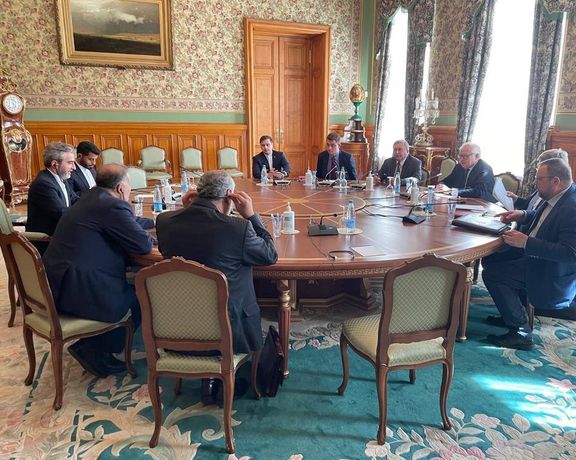
Iran’s nuclear negotiator Ali Bagheri-Kani has tried to dispel criticism of his trip to Moscow following a failed talks with the US in Qatar, saying Russia has no Covid restrictions.

Iran’s nuclear negotiator Ali Bagheri-Kani has tried to dispel criticism of his trip to Moscow following a failed talks with the US in Qatar, saying Russia has no Covid restrictions.
Bagheri-Kani’s immediate trip to Moscow after two days of indirect talks in Qatar with US envoy Rob Malley led to a lot of criticism in Iran by those who resent Moscow’s influence over Tehran and believe Russia is working against a nuclear agreement with Washington.
The trip was kept secret until Russian sources released the news and aphoto of Bagheri-Kani's meeting in Moscow.
Baghaeri Kani told reporters in Tehran on Monday that Iran has been consulting with all the parties to the 2015 nuclear agreement JCPOA, but “because the Russians have no Covid restrictions, sometimes they come and sometimes we go there.” He added that Chinese Covid restrictions make it harder to travel there.
Many newspapers and observers have criticized the Moscow trip after the failed talks.
Former deputy speaker of parliament Ali Motahari tweeted on Sunday that Tehran’s pro-Russia and pro-China policy has gotten to the point that “Russia’s foreign minister comes to Tehran before the Doha talks as if to say that although we are not there, the talks take place with our permission. And after the talks, Iran’s negotiating team immediately goes to Moscow to submit a report, before giving a report to the Iranian people.”
Motahari went on to say that Russia does not want the revival of JCPOA in order to prevent Iran from entering the global oil and gas market. “Unfortunately, our officials have tied our national interests to those of Russia,” he added.
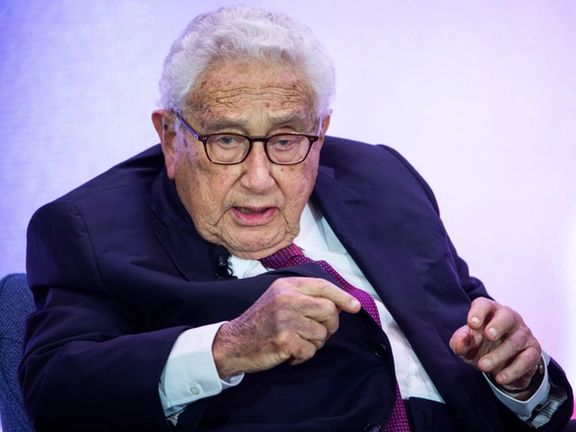
Veteran statesman Henry Kissinger says the trouble with the talks to revive Iran’s nuclear deal is that it is very dangerous to go back to a deal that was inadequate to begin with.
In an interview with British magazine The Spectator published on Saturday, Kissinger, who is a former US Secretary of State and National Security Advisor, added that any modification in the 2015 accord “makes it apparently more tolerable to the adversary."
He noted that if such a deal is reached, the situation of the region might become “much more explosive” because “particularly Israel – Iran’s chief enemy – but also Egypt and Saudi Arabia – whom they see as principal competitors – were going to be driven into reactions.”
Saying that there is really “no alternative to the elimination of an Iranian nuclear force,” Kissinger emphasized that there is “no way you can have peace in the Middle East with nuclear weapons in Iran, because before that happens, there is a high danger of pre-emption by Israel, because Israel cannot wait for deterrents. It can afford only one blow on itself. That is the inherent problem of the crisis.”
“I was extremely doubtful about the original nuclear agreement. I thought Iran’s promises would be very difficult to verify, and that the talks really created a pattern in which the nuclear build-up might have been slowed down a little but made more inevitable,” he said.
Iran’s media is filled with contradictory comments on the outcome of indirect talks with Washington in Qatar this week over the fate of the Vienna negotiations, which have been stalled for months.
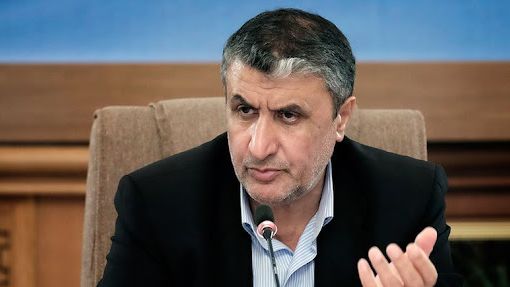
In a surprising move Iran’s nuclear chief has called on the government to consider people’s dire economic situation and try to reach a deal with Washington.
In what appears to be the first criticism of the government's foreign and economic policy from within President Ebrahim Raisi’s administration, the head of Iran’s Nuclear Organization, Mohammad Eslami has said, "The people can no longer tolerate the economic and financial pressures." He called on Iran's nuclear negotiating team "to use a strong political and legal argument" to facilitate the lifting of US sanctions and putting Iran back on track to progress and development.
Eslami, who is also a vice president, said during a speech on June 30 and published on Saturday: "The uncalculated measures taken by a part of the government to reform the cash subsidy system provided a pretext for nationwide dissatisfaction."
He was referring to the government decision in early May to eliminate food import subsidies that led to unusual price rises followed by protests in many parts of the country. However, he also blamed the "world's oppressive powers'" [the Islamic Republic officials' jargon to refer to the United States] opposition to Iran and its “destructive measures” that raises the risk of investment in Iran and creates economic and financial difficulties for the people.
Eslami said that the United States reduced the value of the Iranian currency by 30 to 40 percent in one blow, and Iranians are no longer able to tolerate more economic pressures.
The Iranian currency has dropped significantly since March when nuclear talks to revive the 2015 agreement known as the JCPOA stopped without a final result.
Despite his criticism of the state of the economy, Eslami said elsewhere in his speech: "Iran's economic situation is outstanding. Iran is one of the world's 20 superior economies." This was probably to balance his statements when he realized that he has gone too far in criticizing the government.
He added that the Iranian opposition abroad keeps telling the International Atomic Energy Agency (IAEA) that Iran is working on nuclear bombs. He added that inspections by the IAEA refuted these claims. However, he did not say that on June 8 the IAEA Board of Governors issued a resolution condemning Iran for not answering the agency's questions about traces of nuclear material in undeclared sites.
Eslami also stopped short of mentioning Iran's violations of JCPOA, by producing 60-percent enriched uranium and shortening the time it needs to reach a nuclear breakout point. However, he called on the negotiating team to use strong arguments to win Iran’s case.
This comes while the negotiating team is being criticized by Iranian politicians and analysts for not doing their best mainly because they, particularly the teams leader Ali Bagheri, have opposed the JCPOA since 2015, and have opposed any agreement with the United States since 2011.
Eslami called on officials to respond to the people's complaints about their difficult financial situation.
The most controversial part of Eslami's speech was his reference to "the need for intelligent command and management to prevent the enemy from making gains." This could be taken as a reference to Supreme Leader Ali Khamenei's occasional indecision at tough junctures as he does not wish to assume any responsibility for possible consequences, although he has the final say about everything in Iran including the nuclear program.
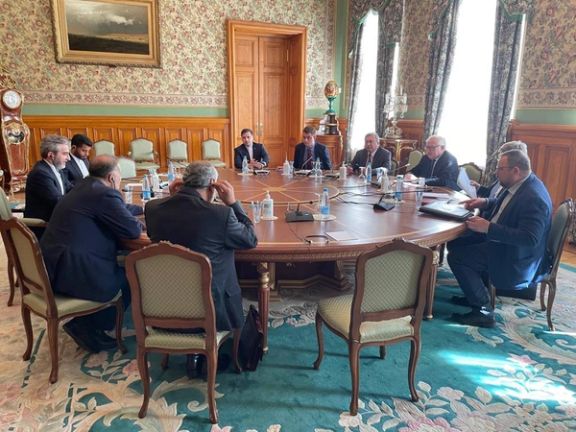
Iran's chief nuclear negotiator Ali Bagheri-Kani has paid an unannounced visit to Russia after Tehran-Washington proximity talks in Doha ended with no results.
The news of the trip to Moscow was released by the twitter account of the Russian permanent mission to the international organizations in Vienna Friday night, but not covered in Iran’s state media.
During his stay, Bagheri-Kani held a meeting with his counterpart Deputy Foreign Minister Sergei Ryabkov while Moscow’s lead negotiator Mikhail Ulyanov was also present in the session.
Ulyanov described the meeting as “a very professional exchange of views” on the current situation around the nuclear deal (the JCPOA, Joint Comprehensive Plan of Action) and prospects of the Vienna negotiations.
He called on the US to “demonstrate greater flexibility,” noting that his assessment is “despite all the difficulties, the nuclear deal still can be restored.”
Earlier in the week in Doha, Bagheri-Kani met Enrique Mora, the European Union official who chaired year-long talks in Vienna aimed at reviving the 2015 landmark deal.
On Friday, UN Under-Secretary-General for Political and Peacebuilding Affairs Rosemary DiCarlo called on both the United States and the Islamic Republic “to quickly mobilize in the same spirit and commitment to resume cooperation under the JCPOA.”
Moreover, in a Thursday statement ahead of a Security Council meeting on the implementation of resolution 2231 that endorsed the 2015 nuclear deal, the UK, France and Germany called on Iran to stop and reverse its nuclear escalation, return to full cooperation with IAEA and seize the offer on the table without further delay.
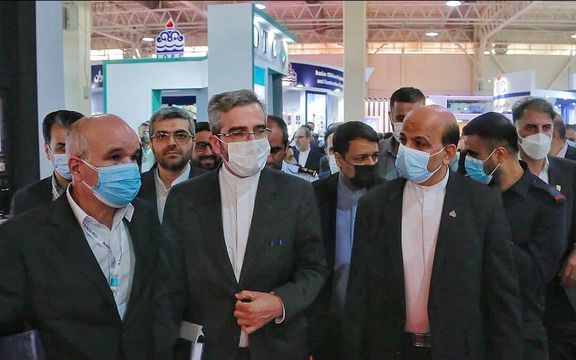
Iranian media and officials have made contradictory comments on the outcome of indirect talks with Washington this week over the fate of the 2015 nuclear deal.
Several Iranian media outlets on Thursday [June 30] quoted an unnamed senior US official as having said that the chances for an agreement have weakened following the talks in Doha," and that "The United States had accepted the changes suggested by European member states, but Iran refused to accept them."
On Friday, Ahmad Alamolhoda, the influential Friday prayer imam in Mashad said he had warned before the meeting "the idea of holding negotiations in Qatar was a trap laid for Iran by the United States." Alamolhoda used exactly the wording chosen to describe the event by the hardliner daily Kayhan, which is close to the office of Supreme Leader Ali Khamenei.
Calling Qatar "a Persian Gulf state dependent on the United States," the firebrand cleric said, "They changed the venue of the negotiations from Vienna to Doha to make us step back from our positions."
"Iran's heroic negotiating team which is headed by a devoted young man who even says his non-compulsory nocturnal prayers every night powerfully resisted against the United States deceit and did not put a step back," Alamolhoda boasted. He also praised Imam Sadeq University for educating "pious individuals such as chief nuclear negotiator Ali Bagheri."
In another development, Iran's former ambassador to Germany Hossein Mousavian, who is currently a member of Princeton University faculoty, wrote in a tweet on 29 June in both English and Persian that "US-Iran-EU nuclear talks in Doha was neither a failure nor a breakthrough. In this round, US and Iranian negotiators got acquainted with the limits of minimum and maximum manoeuvring power of the other side for possible agreement in the next round."
Meanwhile, Mehr News Agency quoted the spokesman for parliament’s National Security and Foreign Relations Committee Abolfazl Amuee as saying that he is no longer optimistic toward the United States returning to the negotiations. "Our initial assessment of the United States' interest in returning to the negotiating table was that they would lift the sanctions. We hope this is true, but we cannot be optimistic about this with any degree of certainty."
Some Iranian news outlets, including the IRGC-linked Tasnim news agency and Noor News, a website close to the Supreme Council of national Security reported that the talks in Doha failed. Some other Iranian news outlets assessed these reports as premature and part of the early biased reporting on the development.
This comes while, according to the reformist website Etemad Online, Foreign Minister Hossein Amir-Abdollahian told his Qatari counterpart that his assessment of the talks was positive. The new spokesman for the Foreign Ministry Nasser Kanani cautiously reported the end of the talks in Doha without any judgement.
Etemad Online opined: "The end of the talks in Doha closed the door to even the smallest hope among the Iranian public. In the near future, the news about the negotiations will no longer have any impact on trends in Iran’s markets." The reformist website suggested that "Under the circumstances the only expectation from the Raisi administration is to bravely and officially announce the death of the 2015 nuclear agreement, as it has already been in a comma for a long time."
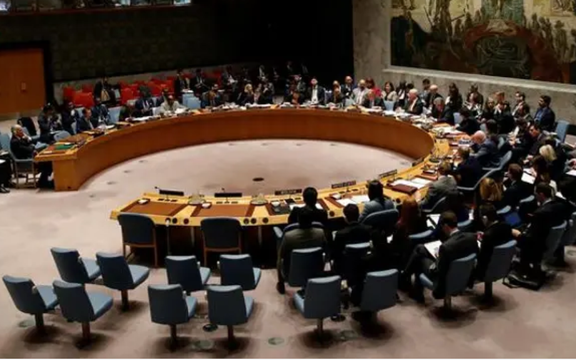
European and American officials have voiced doubt about restoring the 2015 Iran nuclear deal after indirect talks between Washington and Tehran failed this week.
A European Union official said the negotiations with Iran "might not make it over the finishing line" and a US official expressed the view that the odds had lengthened after two days of talks in Qatar.
The UN Security Council met to discuss Iran one day after the talks ended in Doha with no sign of progress on resurrecting the pact.
"I am concerned that we might not make it over the finishing line. My message is: Seize this opportunity to conclude the deal, based on the text that is on the table," European Union Ambassador to the United Nations Olof Skoog said.
The EU coordinates the talks on resurrecting the agreement, which then US President Donald Trump reneged on in 2018 and restored crippling US sanctions on Iran, prompting Tehran to start violating its nuclear restrictions about a year later.
"The prospects for a deal after Doha are worse than they were before Doha and they will be getting worse by the day," the senior US official told Reuters on condition of anonymity.
"You could describe Doha at best as treading water, at worst as moving backwards. But at this point treading water is for all practical purposes moving backwards," he added.
The Security Council met to discuss the latest report by UN Secretary-General Antonio Guterres on the implementation of a 2015 council resolution that enshrines the nuclear deal, formally called the Joint Comprehensive Plan of Action (JCPOA).
US, British and French diplomats all placed the onus on Iran for the failure to revive the agreement after more than a year of negotiations.
Iran "should urgently take this deal - there will not be a better one," Britain's U.N. Ambassador Barbara Woodward said.
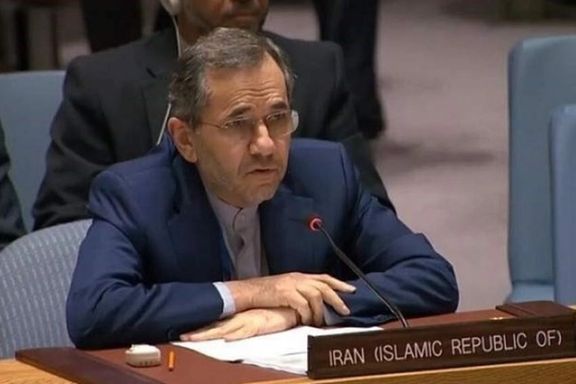
Iranian government media on Friday carried headlines saying the exact opposite, that the onus is on the US to provide more guarantees over the longevity of the deal and more economic benefits.
The US says that in December a final offer was made to Iran, and it will not accept Tehran’s attempts to introduce new elements into the negotiations and make demands “extraneous” to the nuclear issue.
When after 11 months of talks in Vienna the process came to a halt, it became apparent that Iran was demanding the removal of its Revolutionary Guard from the US Foreign Terrorist Organization list. Washington says that is not one of the sanctions related to the nuclear issue.
"Iran has yet to demonstrate any real urgency to conclude a deal, end the current nuclear crisis and achieve important sanctions lifting," Richard Mills, Deputy US Ambassador to the United Nations, told the meeting.
"Not only has Iran not taken up the offer on the table, but it also added yet more issues which fall outside the JCPOA with maximalist and unrealistic demands," French U.N. Ambassador Nicolas de Riviere said.
Iran, however, described the latest talks as "serious and positive" and said it was ready to strike an agreement.
"Iran has demanded verifiable and objective guarantees from the US that JCPOA will not be torpedoed again, that the US will not violate its obligations again, and that sanctions will not be re-imposed under other pretexts or designations," Iran's UN Ambassador Majid Takht Ravanchi told the council.
The senior US official disputed Tehran's argument that Washington was to blame for the lack of progress, saying the United States had responded positively to proposed EU changes to the draft text of an agreement reached in wider talks in March while Iran had failed to respond to those proposals.
"Their vague demands, reopening of settled issues, and requests clearly unrelated to the JCPOA all suggests to us ... that the real discussion that has to take place is (not) between Iran and the US to resolve remaining differences. It is between Iran and Iran ," the senior US official said.
"At this point, we are not sure if they (the Iranians) know what more they want. They didn’t come to Doha with many specifics," he added.
However, Chinese and Russian diplomats faulted the United States, with Beijing's representative urging Washington to ease unilateral US sanctions on Iran and Russia's calling for all sides to show flexibility.
Reporting by Reuters